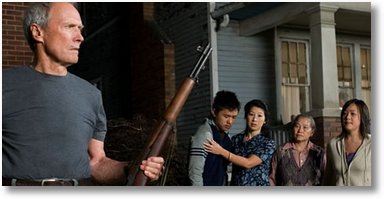Movies tend to become part of the mix over the Holiday Season, and by “Holiday Season” I of course mean Christmas and New Year’s Eve. Nothing, as you can probably surmise at this point, fills me with yuletide cheer quite like political incorrectness. Perhaps that is the reason I’ve already seen Gran Torino three times. Boy, do I love it when all the Academy DVD screeners get released every December!

Stay off Walt’s lawn. Seriously.
But enough about my cinematic procurement practices – Gran Torino is an excellent movie that everyone should see and the classic car may never again be associated with Starsky and Hutch. Walt Kowalski reminds me of another Eastwood character, namely Gunny Highway from Heartbreak Ridge. Both are salty war veterans with very little time for bullshit. Both will sooner swing a fist or cock a pistol than stand around chatting with “slack-jawed fruitcakes”. And, most importantly, both are hard men forced to rethink their respective prejudices when they see ways in which they can have a positive effect on a young person’s life.
Highway is a Marine Core drill sergeant, so molding said fruitcakes into masculine killing machines is his job. Kowalski, on the other hand, is a recently-widowed and exceptionally crusty retiree who regards his children, grandchildren and new Asian neighbors as unbelievable wastes of space.
“Kowalski is a recognizable type, the gruff, sometimes bigoted old man who may be hiding more heart than he lets on. Even though he’s not too caring at the start, “he ends up expressing love to a family he’s never known before,” – Clint Eastwood
The “love” in question is a long time coming. Particularly hilarious are Walt’s exchanges with the family’s Grandmother as she chews tobacco on their front porch and produces dark-brown horks that put Walt’s to shame. “Why do you still live in this neighborhood you proud old rooster?” she asks him in her ancient Hmong dialect. All of the white folks who used to live in Walt’s community, since the end of the Korean War and during his three decades working at the local Ford plant, have indeed long since died or moved away. “Johnson would turn over in his grave if he could see his lawn right now“, Walt remarks to himself during one such staring contest with Grandma.
The “hood” is now just that, with a Latino and Asian gang jockeying for position and the souls of local male residents – although my favorite scene of the entire movie is when Walt spots Sue, the youngest daughter of the neighbor’s brood, being harassed by a trio of African American gentlemen. “Ever notice how you come across somebody once in a while you shouldn’t have messed with? That’s me.” When the distain with which he looks at his own grandchildren is taken into account, Walt’s prejudices may be aimed primarily at younger generations than any one ethnic group. That statement may be a little hard to swallow when he first drives up in his battered white pickup and asks the youths, “What the hell are you spooks doing?” – but bear with me. By the time the credits roll there will be no doubt in your mind that Walt Kowalski is a very good man.
When her younger brother is caught red-handed trying to steal Walt’s prized possession, a mint-condition 1973 Gran Torino which he himself “put the steering column in himself, right on the line“, a new story arc emerges. “Toad” as Walt calls him, was forced by his cousin’s gang to try and steal the car as initiation into their gang – which Walt knows full well Thao does not want to join. The confused young man becomes Walt’s project of sorts, and the two gradually form a tight bond which “saves” both of them in the end. And what a conclusion it is.

“I’m going to buy you some tools so you don’t have to hang out with them anymore.”
Walt starts to liken the Asian gang to the Korean soldiers he fought 50 years earlier during the war. Instead of communism, however, he is battling to save Thao and his family. “I used to stack you five-high and then use you as sand bags. Now get off my lawn“, he tells the leader whilst pointing the same M1 Garand rifle he used overseas during the first of several tense encounters throughout the film. Later in the film, after the friendship develops, he admits to him that he used the gun to blow the heads off quite a few Koreans – no older than Toad himself.
The remorse he obviously begins to feel increases as the movie progresses – particularly when he confides in his late wife’s favorite priest that “it’s not what you’re ordered to do that you remember. It’s what you’re not ordered to do.” Walt’s salvation from his frequently hinted at wartime atrocities presents itself in the form of a likeable young man who really needs his help. “Hmong girls go to college while the boys go to jail,” Sue tells him at one point. Not if Walt has anything to say about it.
I’ll leave the synopsis and the spoilers there. It’s a touching, honest film with as much humor as there is heart. The racial epithets might make a few people cringe (or protest) but that’s how some people talk and Walt, a “stupid Polack” as his barber likes to remind him, isn’t spared. I’d like to make a list of all the slang terms used in the film and probably will during my inevitable fourth viewing of this superb film. Can’t recommend it enough and if reading this “review” leads you to watch it please come back and leave a comment telling me what you thought. Likewise, if you’ve seen it, I want to hear your thoughts.

Grand Torino was the best film I’ve seen in years. If Eastwood doesn’t load up on Oscars come awards night, then there is no justice. I hope I’m half as tough as him when I get to be his age.
I was also very moved by this movie, which I saw last night on TV. I am a 70-year-old professor, about to retire, who teaches a course in aging. I believe that this movie is an excellent example of elder wisdom. I am copnsidering showing it to my class this fall Way to go Clint!
Dr. Larry Anderson
Kwantlen Polytechnic University